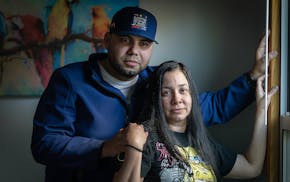Time is running out for Minnesotans who lost equity, after their property was seized and sold because of delinquent taxes, to get part of a $109 million settlement fund.
Thousands of Minnesotans are potentially eligible for part of a class-action settlement, but they have to file a claim before Friday, June 6. So far, less than 1,000 of the nearly 8,000 eligible seized properties have had a claim.
"We have been sending out notices, trying to get it on people's radar. If you were going to file a claim, now is the time to do it," said Vildan Teske, an attorney who worked on the case that went all the way to the U.S. Supreme Court.
Garrett Blanchfield, another attorney on the case, said these seizures often took people's largest asset that they spent years building equity in, but tax bills piled up.
"We are really focused on trying to get this money back to these people," Blanchfield said. "They're the ones who could least afford to lose the biggest asset they had."
The Legislature created the fund in 2024, after the Supreme Court ruled a century-old Minnesota law allowing counties to seize and sell properties with years of unpaid taxes was unconstitutional. The law allowed counties, cities and school districts to split the profits of a sale after unpaid property taxes, interest, fees and other expenses were paid off.
The unanimous 2023 ruling found the law violated the Fifth Amendment prohibition on seizing property without just compensation. Lawsuits followed the decision and more than a dozen states with similar laws are addressing the fallout.
The initial lawsuit was filed by Geraldine Tyler against Hennepin County, which in 2015 seized her north Minneapolis condominium and sold it because she owed $2,300 in back taxes and $13,200 in interest, penalties and fees. Tyler purchased the condo in 1999 and moved into an assisted living facility in 2010, leaving the taxes unpaid.
Hennepin County sold the condo for $40,000 and after settling the debt, split the proceeds with the city and school district, as allowed under state law at the time.
Daniel Rogan, Hennepin County auditor, said tax forfeitures are a last resort after years of trying to help property owners catch up on taxes or sell their property. About 510 properties in Hennepin County are eligible for settlement funds.
"These are unfortunate cases when it comes to a forfeiture, because it means, for whatever reason, the government has to step in," Rogan said. "Our hope is to try to keep people in their home or to help them figure out a way to avoid it becoming a forfeited property."
Residents with valid claims will get back up to 90% of their property's value plus 4.5% interest, after back taxes and fees are paid. Some recipients will receive tens of thousands of dollars and others more than $100,000.
Tyler died earlier this year at 96. Teske said it was "quite gratifying" for Tyler to have the high court unanimously decide the case in her favor.
Minnesotans who think they are eligible for part of the settlement can learn more and make a claim at mntaxforfeituresettlement.com.
Due to the timing of the lawsuits and the statute of limitations, Hennepin County properties forfeited between 2012 and 2023 are eligible for settlement funds while the window for other counties is 2016 until 2023.
Life on TikTok gave transgender Minnesota man the illusion of love and a sad, brutal end
How a 13-ton piece of public art no one wanted found a Minnesota home

Venezuelan family in Minnesota pursues asylum amid court battle over TPS

Trump says US Steel will keep HQ in Pittsburgh as part of $14B 'partnership' with Japan-based Nippon
